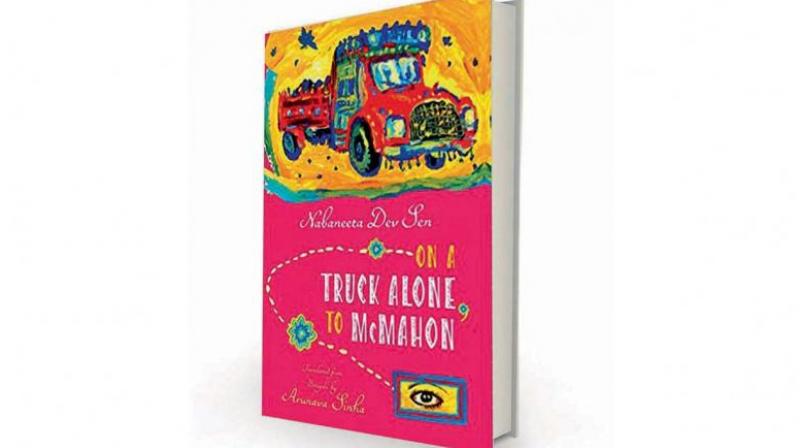Hilarious and gripping adventure
The book is Dev Sen's diary-ish account of her 1977 trip to Tawang.

For one mad moment after I finished reading On a Truck Alone to McMahon by Nabaneeta Dev Sen, translated by Arunava Sinha, I wished I’d done comparative literature at Jadavpur University (JU) instead of English literature at Calcutta University. That’s because I’ve never had an eccentric professor, though I’ve read enough about them to really want to meet one, and to judge by this book, Dev Sen, a professor of comparative literature at JU, is as eccentric as they come.
But actually, in thinking of Dev Sen as eccentric, I’m doing her a grave injustice, an injustice to her and every woman in the world including myself, because what she really is, again to judge by this book, is a person who lives as freely as anyone can: in fact, as many men do, but many women feel they shouldn’t because that is what they have been taught to believe in. The fact that Dev Sen doesn’t care about “shouldn’ts” doesn’t make her eccentric. Instead, it makes her deeply admirable.
On a Truck Alone to McMahon is Dev Sen’s diary-ish account of her 1977 trip to Tawang, which she decided to make all of a sudden after attending the Assam Women’s Literature conference in Jorhat, Assam.
Travelling to Tezpur after the conference at the invitation of its convener, she chats with a man on the ferry across the Brahmaputra who tells her he’s from Bomdila which was where the Chinese Army was stopped in its invasion of India in 1962 via the Indo-Tibetan border, the McMahon Line.
Jeep Babu, as Dev Sen refers to him because his jeep has printed yellow curtains at the windows, informs her of all the wonders to be found in Tawang, including a marvellous road built in only 10 days by the Chinese to facilitate their invasion, the rumours of both Indian and Chinese troops building and occupying tunnels in the mountains, and the magnificent gompa (Buddhist temple).
Little does poor Jeep Babu know that this innocent conversation will instantly cause havoc not only in his life but in the lives of everyone Dev Sen comes in contact with thereafter, because, with just over week left of her holidays, the good professor is suddenly infected with an urge to visit Tawang.
And she’s determined to do it too, however ill-prepared she is by way of clothing — she has no warm clothes with her suitable for the mountains — and she is ignorant of such administrative matters as the “inner line permits” that even Indian citizens require if they want to go to the farthest parts of the Northeast.
No one understands why this distinguished Bengali writer and professor should suddenly want to get up and leave for a part of India that has no hotels, no transport, no reasonable assurance of personal safety — frankly, not a lot of anything. She herself has no “reasonable” explanation for why she wants to go. She doesn’t want to study ancient Tibetan manuscripts.
She doesn’t want to investigate Buddhist philosophy. She doesn’t want to explore Sino-Tibetan languages. She doesn’t want to write an article for a magazine, or a book (she deliberately wrote this book years later just to prove that she wanted to go to Tawang for no reason except her wish to do so). She doesn’t want to research the Sino-India war for the betterment of political science. As she tells her friends on the ferry to Tezpur: “I keep telling you it’s not for research. Pure curiosity. So that I can say, ‘I climbed the mountain because it’s there.’ Tawang’s there, so I want to go.”
The only person who supports Dev Sen in her desire is a schoolboy, the son of her hosts in Tezpur. While his parents and every other adult in Tezpur come up with three million and one reasons in quick succession why Dev Sen should just stay right where she is — or simply go to Guwahati because “Guwahati is there too” — young Shami thinks she’s perfectly rational in her decision to make the journey. If she wants to go, he tells his parents, why shouldn’t she?
Why indeed shouldn’t she? In any case, no shouldn’ts will stop Dev Sen. One after another, all the obstacles in her way come crashing down. She gets her “inner line permit”. She gets her warm clothes. She gets transport to Tawang. And when that transport breaks down, she gets on a ration truck instead, and, one adventure after another, finally gets to Tawang.
On A Truck Alone to McMahon is not a travelogue. If that’s what you want, complete with what to do, what to buy, and where to stay and eat, read something else.
This book is about a journey: the getting there is almost all the fun. What happens there is not the point, though Dev Sen’s sense of curiosity and adventure makes even the slightest incident exhilarating.
Her adventure is completely terrifying to the young doctor she attaches herself to on the truck to Tawang, whose virtuous ideas of Indian male-female propriety she completely overturns even as she assures him of his continued chastity despite her presence in his life.
The doctor episodes are some of the funniest in this almost wholly hilarious book. Dev Sen’s independence gets my utmost respect; her love of life gets my admiration; and her sense of humour makes me envious. I really wish I knew her. Read this book: it will make your month.
Kushalrani Gulab is a freelance editor and writer who dreams of being a sanyasi by the sea

